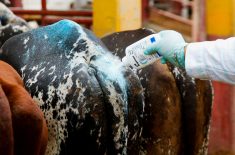The Canadian Food Inspection Agency has boosted requirements for testing and reporting of listeria in processing plants that make cold cuts and other ready-to-eat (RTE) meats.
The new requirements, which were announced Friday to take effect immediately, call for production facilities to implement “rigourous environmental testing” for listeria and to “immediately” report positive results to CFIA.
A sampling procedure, for CFIA to ensure compliance, will be instituted, the agency said Friday.
“In the coming weeks, the CFIA will initiate a process to ensure that Canada’s trading partners are ready and able to provide an equal level of listeria control for the products they export to Canada,” CFIA said.
Read Also

U.S. not ready to lift Mexican cattle ban over screwworm, Agriculture Secretary Rollins says
The U.S. is not yet ready to reopen its border to Mexican cattle amid an outbreak of the flesh-eating New World screwworm parasite, Agriculture Secretary Brooke Rollins said, but she is pleased with Mexico’s efforts to contain the pest.
CFIA will “verify the effectiveness” of actions that plant operators take to respond to positive listeria findings. CFIA said it will undertake an “expanded detection program” for listeria and other foodborne microbial pathogens.
The new requirements are now part of CFIA’s Meat Hygiene Manual of Procedures.
The new requirements and other changes follow last summer’s outbreak of listeriosis that killed 20 people, connected to a strain of Listeria monocytogenes bacteria that in turn was linked to an RTE plant operated by Maple Leaf Foods in Toronto.
“This new government listeria management policy sets a new and more stringent regulatory standard,” Maple Leaf CEO Michael McCain said in a separate release Friday.
“To a great extent we have put in place enhanced food safety protocols that meet or exceed these new requirements. The goal of industry should not be to simply meet the standard, but like Maple Leaf should seek to exceed it.
“Our aggressive programs have demonstrated that listeria will be found routinely” in RTE plants, McCain said. “Early detection is important as it ensures appropriate remedial actions are taken.
“While our company has learned, and continues to learn, that listeria control requires enormous attention to detail and rigour, the first step is to aggressively test to find where listeria will thrive in the plant environment and prevent it from entering the food supply.”










